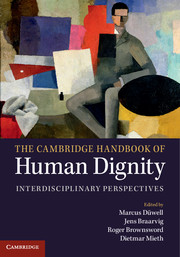Book contents
- Frontmatter
- Contents
- List of contributors
- Foreword
- Why a handbook on human dignity?
- Acknowledgments
- 1 Human dignity from a legal perspective
- 2 Human dignity: concepts, discussions, philosophical perspectives
- Part I Origins of the concept in European history
- Part II Beyond the scope of the European tradition
- Part III Systematic conceptualization
- Part IV Legal implementation
- 36 Equal dignity in international human rights
- 37 Is human dignity a useless concept? Legal perspectives
- 38 Human dignity in French law
- 39 Human dignity in German law
- 40 Human dignity in US law
- 41 Human dignity in South American law
- 42 Human dignity in South African law
- 43 The Islamic world and the alternative declarations of human rights
- 44 The protection of human dignity under Chinese law
- 45 Human dignity in Japanese law
- 46 The place of dignity in the Indian Constitution
- Part V Conflicts and violence
- Part VI Contexts of justice
- Part VII Biology and bioethics
- Appendix 1 Further reading
- Appendix 2 Universal Declaration of Human Rights
- Index
- References
38 - Human dignity in French law
from Part IV - Legal implementation
Published online by Cambridge University Press: 05 March 2015
- Frontmatter
- Contents
- List of contributors
- Foreword
- Why a handbook on human dignity?
- Acknowledgments
- 1 Human dignity from a legal perspective
- 2 Human dignity: concepts, discussions, philosophical perspectives
- Part I Origins of the concept in European history
- Part II Beyond the scope of the European tradition
- Part III Systematic conceptualization
- Part IV Legal implementation
- 36 Equal dignity in international human rights
- 37 Is human dignity a useless concept? Legal perspectives
- 38 Human dignity in French law
- 39 Human dignity in German law
- 40 Human dignity in US law
- 41 Human dignity in South American law
- 42 Human dignity in South African law
- 43 The Islamic world and the alternative declarations of human rights
- 44 The protection of human dignity under Chinese law
- 45 Human dignity in Japanese law
- 46 The place of dignity in the Indian Constitution
- Part V Conflicts and violence
- Part VI Contexts of justice
- Part VII Biology and bioethics
- Appendix 1 Further reading
- Appendix 2 Universal Declaration of Human Rights
- Index
- References
Summary
As most of the contributions to this part of the handbook have underlined, human dignity certainly is a foundational concept of the Universal Declaration of Human Rights (UDHR). The UDHR however, can hardly be described as foundational – or even central – to the French legal order. Although it was signed in Paris, the technical fact that France never ratified the Declaration is quite emblematic of its actual standing within the French legal order. That is to say, the human dignity concept that underpins the Declaration has a rather limited echo in French law. Although it did have a strong philosophical and political influence in the post-war decades, it remained essentially absent from legal norms; mostly, it was an a-juridical principle. When, later on, it eventually was articulated as a legal (constitutional) concept, its meaning began to be intensely debated and some of its normative uses did in fact part with its function as a basis of and premise for human rights. To this day, both the meaning and the importance of a legal principle of human dignity remain uncertain in France.
Human dignity: an uncertain concept
France prides itself on the global influence of its 1789 Declaration of Rights of Man and Citizen, and gloriously tends to speak and stand up to the world as the land of human rights. But the 1789 Declaration ignores human dignity, and the dignity of man that the UDHR promoted was mostly absent from French law until well into the 1990s (Girard and Hennette-Vauchez 2005); it remained, in other words, a concept that legal theorists and human rights activists would refer to as the ultimate justification for human rights, but that was only very marginally used in positive law.
- Type
- Chapter
- Information
- The Cambridge Handbook of Human DignityInterdisciplinary Perspectives, pp. 368 - 374Publisher: Cambridge University PressPrint publication year: 2014
References
- 7
- Cited by



